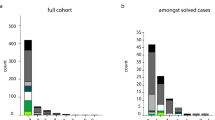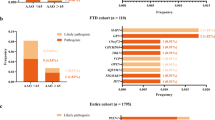Abstract
Frontotemporal lobar degeneration (FTLD) is the second most common cause of presenile dementia. The predominant neuropathology is FTLD with TAR DNA-binding protein (TDP-43) inclusions (FTLD-TDP)1. FTLD-TDP is frequently familial, resulting from mutations in GRN (which encodes progranulin). We assembled an international collaboration to identify susceptibility loci for FTLD-TDP through a genome-wide association study of 515 individuals with FTLD-TDP. We found that FTLD-TDP associates with multiple SNPs mapping to a single linkage disequilibrium block on 7p21 that contains TMEM106B. Three SNPs retained genome-wide significance following Bonferroni correction (top SNP rs1990622, P = 1.08 × 10−11; odds ratio, minor allele (C) 0.61, 95% CI 0.53–0.71). The association replicated in 89 FTLD-TDP cases (rs1990622; P = 2 × 10−4). TMEM106B variants may confer risk of FTLD-TDP by increasing TMEM106B expression. TMEM106B variants also contribute to genetic risk for FTLD-TDP in individuals with mutations in GRN. Our data implicate variants in TMEM106B as a strong risk factor for FTLD-TDP, suggesting an underlying pathogenic mechanism.
This is a preview of subscription content, access via your institution
Access options
Subscribe to this journal
Receive 12 print issues and online access
$209.00 per year
only $17.42 per issue
Buy this article
- Purchase on Springer Link
- Instant access to full article PDF
Prices may be subject to local taxes which are calculated during checkout



Similar content being viewed by others
Accession codes
References
Cairns, N.J. et al. Neuropathologic diagnostic and nosologic criteria for frontotemporal lobar degeneration: consensus of the Consortium for Frontotemporal Lobar Degeneration. Acta Neuropathol. 114, 5–22 (2007).
Neary, D. et al. Frontotemporal lobar degeneration: a consensus on clinical diagnostic criteria. Neurology 51, 1546–1554 (1998).
McKhann, G.M. et al. Clinical and pathological diagnosis of frontotemporal dementia: report of the Work Group on Frontotemporal Dementia and Pick's Disease. Arch. Neurol. 58, 1803–1809 (2001).
Mercy, L., Hodges, J.R., Dawson, K., Barker, R.A. & Brayne, C. Incidence of early-onset dementias in Cambridgeshire, United Kingdom. Neurology 71, 1496–1499 (2008).
Ratnavalli, E., Brayne, C., Dawson, K. & Hodges, J.R. The prevalence of frontotemporal dementia. Neurology 58, 1615–1621 (2002).
Forman, M.S. et al. Frontotemporal dementia: clinicopathological correlations. Ann. Neurol. 59, 952–962 (2006).
Goldman, J.S. et al. Frontotemporal dementia: genetics and genetic counseling dilemmas. Neurologist 10, 227–234 (2004).
Baker, M. et al. Mutations in progranulin cause tau-negative frontotemporal dementia linked to chromosome 17. Nature 442, 916–919 (2006).
Cruts, M. et al. Null mutations in progranulin cause ubiquitin-positive frontotemporal dementia linked to chromosome 17q21. Nature 442, 920–924 (2006).
Gass, J. et al. Mutations in progranulin are a major cause of ubiquitin-positive frontotemporal lobar degeneration. Hum. Mol. Genet. 15, 2988–3001 (2006).
Gijselinck, I., Van Broeckhoven, C. & Cruts, M. Granulin mutations associated with frontotemporal lobar degeneration and related disorders: an update. Hum. Mutat. 29, 1373–1386 (2008).
Cruts, M. & Van Broeckhoven, C. Loss of progranulin function in frontotemporal lobar degeneration. Trends Genet. 24, 186–194 (2008).
Van Deerlin, V.M. et al. Clinical, genetic and pathologic characteristics of patients with frontotemporal dementia and progranulin mutations. Arch. Neurol. 64, 1148–1153 (2007).
Hakonarson, H. et al. A genome-wide association study identifies KIAA0350 as a type 1 diabetes gene. Nature 448, 591–594 (2007).
McCarthy, M.I. et al. Genome-wide association studies for complex traits: consensus, uncertainty and challenges. Nat. Rev. Genet. 9, 356–369 (2008).
Neumann, M. et al. Ubiquitinated TDP-43 in frontotemporal lobar degeneration and amyotrophic lateral sclerosis. Science 314, 130–133 (2006).
Cairns, N.J. et al. TDP-43 in familial and sporadic frontotemporal lobar degeneration with ubiquitin inclusions. Am. J. Pathol. 171, 227–240 (2007).
Mackenzie, I.R. et al. Nomenclature for neuropathologic subtypes of frontotemporal lobar degeneration: consensus recommendations. Acta Neuropathol. 117, 15–18 (2009).
Falush, D., Stephens, M. & Pritchard, J.K. Inference of population structure using multilocus genotype data: linked loci and correlated allele frequencies. Genetics 164, 1567–1587 (2003).
Patterson, N., Price, A.L. & Reich, D. Population structure and eigenanalysis. PLoS Genet. 2, e190 (2006).
Luca, D. et al. On the use of general control samples for genome-wide association studies: genetic matching highlights causal variants. Am. J. Hum. Genet. 82, 453–463 (2008).
Dixon, A.L. et al. A genome-wide association study of global gene expression. Nat. Genet. 39, 1202–1207 (2007).
Chen-Plotkin, A.S. et al. Variations in the progranulin gene affect global gene expression in frontotemporal lobar degeneration. Hum. Mol. Genet. 17, 1349–1362 (2008).
Pastor, P. et al. Apolipoprotein Epsilon4 modifies Alzheimer's disease onset in an E280A PS1 kindred. Ann. Neurol. 54, 163–169 (2003).
Wijsman, E.M. et al. APOE and other loci affect age-at-onset in Alzheimer's disease families with PS2 mutation. Am. J. Med. Genet. B. Neuropsychiatr. Genet. 132B, 14–20 (2005).
Le Ber, I. et al. Chromosome 9p-linked families with frontotemporal dementia associated with motor neuron disease. Neurology 72, 1669–1676 (2009).
Wellcome Trust Case Control Consortium. Genome-wide association study of 14,000 cases of seven common diseases and 3,000 shared controls. Nature 447, 661–678 (2007).
Scheet, P. & Stephens, M. A fast and flexible statistical model for large-scale population genotype data: applications to inferring missing genotypes and haplotypic phase. Am. J. Hum. Genet. 78, 629–644 (2006).
Livak, K.J. & Schmittgen, T.D. Analysis of relative gene expression data using real-time quantitative PCR and the 2(-ΔΔ C(T)) method. Methods. 25, 402–408 (2001).
Acknowledgements
This project was enabled by the contributions and efforts of many individuals in several supportive capacities. Most importantly, we extend our appreciation to the study subjects and families who made this research possible. Extensive technical assistance was provided by R. Greene, T. Unger and C. Kim and study coordination was provided by E. McCarty Wood. The following individuals contributed through sample ascertainment, epidemiology, coordination, and/or clinical evaluation of cases: S.Weintraub, N. Johnson, C. Shaw, V. Haroutunian, R.C. Petersen, D.S. Knopman, K.A. Josephs, D. Neary, J. Snowden, J. Heidebrink, N. Barbas, R. Reñe, J.R. Burke, K. Hayden, J. Browndyke, P. Gaskell, M. Szymanski, J.D. Glass, M. Rossor, F. Moreno, B. Indakoetxea, M. Barandiaran, S. Engelborghs, P.P. De Deyn, W.S. Brooks, T. Chow, V. Meininger, L. Lacomblez and E. Gruenblatt. The following individuals contributed through pathological characterization and evaluation of cases: D. Clark, A. King, I. Bodi, D. Purohit, L. Kwong, J.E. Parisi, W. Kamphorst, I. Ruiz, T. Revesz, J.-J. Martin, R. Highley and C. Duyckaerts. The following individuals contributed through general technical assistance and/or genetic studies: J. Kirby, E. Moore, M. Baker, R. Crook, S. Rollinson, N. Halliwell, S. Usher, R.M. Richardson, M. Mishra, C. Foong, J. Ervin, K. Price Bryan, J. Ervin, C. Kubilus, A. Gorostidi, M. Cruts, I. Gijselinck, H. McCann, P.R. Schofield, G. Forster, K. Firch, J. Pomaician, I. Leber, V. Sazdovitch and I. Volkmann. We also thank the Brain Bank of University of Barcelona, Hospital Clinic, Clinic for Alzheimer's Disease and Related Disorders University of British Columbia, Australian Brain Donor Programs supported by the National Health and Medical Research Council of Australia, Biobank at the Institute Born-Bunge, University of Antwerp, Antwerpen, Belgium and the French clinical and genetic research network on FTD/FTD-motor neuron disease (MND). Many grant funding agencies provided financial support for this study, including the US National Institutes of Health (NIH) (grant numbers AG10124, AG17586, AG16574, AG03949, AG17586, NS44266, AG15116, NS53488, AG10124, AG010133, AG08671, NS044233, NS15655, AG008017, AG13854, AG12300, AG028377, AG 019724, AG13846, AG025688, AG05133, AG08702, AG05146, AG005136, AG005681, AG03991, AG010129, AG05134, NS038372, AG02219, AG05138, AG10161, AG19610, AG19610, AG16570, AG16570, AG05142, AG005131, AG5131, AG18440, AG16582, AG16573, AG033101 and NIH Intramural Program). Additional funds were provided by Robert and Clarice Smith and Abigail Van Buren Alzheimer's Disease Research Program, the Pacific Alzheimer's disease Research Foundation (PARF) grant #C06-01, the Alzheimer's Research Trust, Alzheimer's Society, Medical Research Council (Programme Grant and Returning Scientist Award), Stichting Dioraphte (07010500), Hersenstichting (15F07.2.34), Prinses Beatrix Fonds (006-0204), Winspear Family Center for Research on the Neuropathology of Alzheimer Disease, the McCune Foundation, Instituto Carlos III, Federal Ministry of Education and Research (01GI0505), SAIOTEK Program (Basque Government), Department of Innovation, Diputación Foral de Gipúzkoa (DFG 0876/08), ILUNDAIN Fundazioa, Centro de Investigaciones Biomedicas en Red en Enfermededades Neurodegenerativas (CIBERNED), Wellcome Trust, Canadian Institutes of Health Research (75480), Fund for Scientific Research Flanders (FWO-V), Alzheimer Research (SAO/FRMA), Interuniversity Attraction Poles (IAP) P6/43 network of the Belgian Science Policy Office (BELSPO), J.v.d.Z receives a postdoctoral fellowship from the FWO-V, the Joseph Iseman Fund, the Louis and Rachel Rudin Foundation, National Health and Medical Research Council of Australia, Veteran's Affairs Research Funds, Arizona Department of Health Services (contract 211002, Arizona Alzheimer's Research Center), the Arizona Biomedical Research Commission (contracts 4001, 0011 and 05-901 to the Arizona Parkinson's Disease Consortium), the Prescott Family Initiative of the Michael J. Fox Foundation for Parkinson's Research, the Daljits and Elaine Sarkara Chair in Diagnostic Medicine, BrainNet Europe II, Ministerio de Ciencia y Tecnología, Ref Saud y Farmacia 2001–4888, Burroghs Wellcome Fund Career Award for Medical Scientists and Fundacion 'La Caxia'.
Author information
Authors and Affiliations
Contributions
V.M.V.D., P.M.A.S., M.M.-L. and A.C.-P. contributed equally to this manuscript. The overall study was designed and implemented by V.M.-Y.L., J.Q.T., V.M.V.D., H.H. and M.M.-L. and discussed with G.D.S., L.-S.W. and A.C.-P. Coordination, sample handling, DNA extraction, genetic analysis and data management were done primarily by V.M.V.D. and M.M.-L. Genotyping and additional testing, including immunohistochemical analysis, was done by P.M.A.S., H.H., V.M.V.D. or M.M.-L. Data analysis and quality control were performed by P.M.A.S., L.-S.W. and A.C.-P. and discussed and reviewed by V.M.V.D., H.H., G.D.S., V.M.-Y.L., J.Q.T. and M.M.-L. Expression analysis was designed and implemented by A.C.-P. The manuscript was prepared by A.C.-P., V.M.V.D. and P.M.A.S. and reviewed by M.M.-L., G.D.S., H.H., J.Q.T., V.M.-Y.L. and L.-S.W. The members of the International FTLD Collaboration, which includes all other authors, contributed cases, evaluated pathology, performed genetic studies and reviewed the manuscript.
Corresponding authors
Ethics declarations
Competing interests
A patent application on TMEM106B has been submitted. J.L. is currently involved in clinical trials involving Elan, Janssen, Medivation and Ceregene. H.F. is a full-time employee in Neuroscience Global Clinical Research and Development at Bristol-Myers Squibb from January 2009.
Supplementary information
Supplementary Text and Figures
Supplementary Figures 1–4 and Supplementary Tables 1–10. (PDF 772 kb)
Supplementary Data 1
Raw data for the experiments shown in Figure 2a-c and Supplementary Figure 2. (XLS 15 kb)
Supplementary Data 2
Raw data for the experiment shown in Figure 2d. (XLS 13 kb)
Rights and permissions
About this article
Cite this article
Van Deerlin, V., Sleiman, P., Martinez-Lage, M. et al. Common variants at 7p21 are associated with frontotemporal lobar degeneration with TDP-43 inclusions. Nat Genet 42, 234–239 (2010). https://doi.org/10.1038/ng.536
Received:
Accepted:
Published:
Issue Date:
DOI: https://doi.org/10.1038/ng.536
This article is cited by
-
Cell subtype-specific effects of genetic variation in the Alzheimer’s disease brain
Nature Genetics (2024)
-
Shared genetic risk loci between Alzheimer’s disease and related dementias, Parkinson’s disease, and amyotrophic lateral sclerosis
Alzheimer's Research & Therapy (2023)
-
Inflammation and neuronal gene expression changes differ in early versus late chronic traumatic encephalopathy brain
BMC Medical Genomics (2023)
-
The major TMEM106B dementia risk allele affects TMEM106B protein levels, fibril formation, and myelin lipid homeostasis in the ageing human hippocampus
Molecular Neurodegeneration (2023)
-
Lack of a protective effect of the Tmem106b “protective SNP” in the Grn knockout mouse model for frontotemporal lobar degeneration
Acta Neuropathologica Communications (2023)



